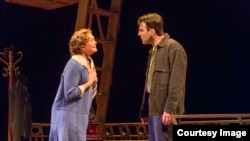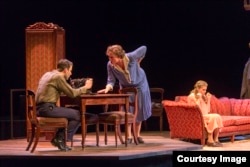NEW YORK —
Theater audiences first met the dysfunctional Wingfield family nearly 70 years ago in Tennessee Williams’ The Glass Menagerie.
His tale of heartbreak and faded dreams, inspired partly by the playwright's own family dynamics, has resonated powerfully with audiences through the decades.
The latest revival of this classic is on Broadway, where audiences enter the Booth Theater to find a simple, but striking vision.
Onstage, there’s the scantest representation of a cramped apartment, but there are no walls, just a sofa, dining room table and a couple of other pieces of furniture, with a long tilted fire escape reaching upward. Other than that, everything’s black. The whole set seems to be floating in a void.
"I want people who hate the theater to see it," said two-time Tony Award winner Cherry Jones, who plays Amanda, the iron-willed mother at the heart of The Glass Menagerie. "Because I really do think it’s one of those productions that could change people’s minds about the theater. This production takes people places they have never been before."
When The Glass Menagerie debuted on Broadway in 1945, it established Williams as one of the greatest playwrights of his generation. He went on to win the Pulitzer Prize for A Streetcar Named Desire and Cat on a Hot Tin Roof.
But, of all his plays, The Glass Menagerie was both Williams’ most nakedly autobiographical and least naturalistic. His script calls for music and stage magic - characters appear out of thin air, as if conjured by Tom, the play’s narrator.
Director John Tiffany says Williams was very clear in his stage directions and that The Glass Menagerie is impressionistic, a memory play.
"He begs us, as theater makers, not to go down the path of naturalism, not to have a real Frigidaire [refrigerator] and real ice cubes tinkling in a glass," Tiffany said. "For Tennessee, that wasn’t where theater was at its best. He said it’s a place of the imagination, where poetry, not just poetry of words, but poetry of gesture, poetry of design, poetry of lighting, poetry of acting, all comes together and meets above and between the audience and actors. And I really, really was taken by that."
Tiffany’s production is highly stylized with subtly-choreographed movement during the scene changes which are meant to complement the poetry of the text. Film and television star Zachary Quinto is making his Broadway debut as Tom, the stand-in for Tennessee Williams, whose given name really was Tom.
"For me, it is the language, it is the poetry, it is the distillation of his own life, his own experience and the people that he loved the most that are in this play," Quinto said.
Quinto read a lot of biographical material about Williams to prepare for the play, particularly about his complicated relationship with his mother and sister.
"Learning that dynamic and understanding that Tennessee spent his entire life both trying to capture something in his writing, but also trying to escape something in his writing, was something that informed me a great deal," Quinto said.
In the play, the father has abandoned his family. Tom, the young writer, works a dead-end job in a shoe factory, helping to support his determined mother, Amanda, and his sister, Laura, who’s both physically and emotionally disabled. She lives out a kind of fantasy life, tending to a collection of glass figurines; her glass menagerie. In real life, Williams’ sister, Rose, was diagnosed with schizophrenia, sent to a mental hospital and lobotomized, says Quinto.
"How tragically her life unfolded, is something that Tennessee never fully reconciled within himself or probably even forgave himself for, on some level," he said.
Jones says all the characters in The Glass Menagerie are in desperate straits, particularly her character, Amanda.
"Her son is about to fly away, never to seen or heard from again and she knows it," Jones said. "And her daughter is mentally completely stifled. She cannot move. And so it’s like a parent with a severely challenged child, physically or mentally. 'What in the world is going to happen to that child when I’m gone?'"
Amanda encourages Tom to invite a friend to date his sister but, as so often happens in real life, hope turns into heartbreak.
The Glass Menagerie once again taps into the audience's emotions, as it has for 70 years.
His tale of heartbreak and faded dreams, inspired partly by the playwright's own family dynamics, has resonated powerfully with audiences through the decades.
The latest revival of this classic is on Broadway, where audiences enter the Booth Theater to find a simple, but striking vision.
Onstage, there’s the scantest representation of a cramped apartment, but there are no walls, just a sofa, dining room table and a couple of other pieces of furniture, with a long tilted fire escape reaching upward. Other than that, everything’s black. The whole set seems to be floating in a void.
"I want people who hate the theater to see it," said two-time Tony Award winner Cherry Jones, who plays Amanda, the iron-willed mother at the heart of The Glass Menagerie. "Because I really do think it’s one of those productions that could change people’s minds about the theater. This production takes people places they have never been before."
When The Glass Menagerie debuted on Broadway in 1945, it established Williams as one of the greatest playwrights of his generation. He went on to win the Pulitzer Prize for A Streetcar Named Desire and Cat on a Hot Tin Roof.
But, of all his plays, The Glass Menagerie was both Williams’ most nakedly autobiographical and least naturalistic. His script calls for music and stage magic - characters appear out of thin air, as if conjured by Tom, the play’s narrator.
Director John Tiffany says Williams was very clear in his stage directions and that The Glass Menagerie is impressionistic, a memory play.
"He begs us, as theater makers, not to go down the path of naturalism, not to have a real Frigidaire [refrigerator] and real ice cubes tinkling in a glass," Tiffany said. "For Tennessee, that wasn’t where theater was at its best. He said it’s a place of the imagination, where poetry, not just poetry of words, but poetry of gesture, poetry of design, poetry of lighting, poetry of acting, all comes together and meets above and between the audience and actors. And I really, really was taken by that."
Tiffany’s production is highly stylized with subtly-choreographed movement during the scene changes which are meant to complement the poetry of the text. Film and television star Zachary Quinto is making his Broadway debut as Tom, the stand-in for Tennessee Williams, whose given name really was Tom.
"For me, it is the language, it is the poetry, it is the distillation of his own life, his own experience and the people that he loved the most that are in this play," Quinto said.
Quinto read a lot of biographical material about Williams to prepare for the play, particularly about his complicated relationship with his mother and sister.
"Learning that dynamic and understanding that Tennessee spent his entire life both trying to capture something in his writing, but also trying to escape something in his writing, was something that informed me a great deal," Quinto said.
In the play, the father has abandoned his family. Tom, the young writer, works a dead-end job in a shoe factory, helping to support his determined mother, Amanda, and his sister, Laura, who’s both physically and emotionally disabled. She lives out a kind of fantasy life, tending to a collection of glass figurines; her glass menagerie. In real life, Williams’ sister, Rose, was diagnosed with schizophrenia, sent to a mental hospital and lobotomized, says Quinto.
"How tragically her life unfolded, is something that Tennessee never fully reconciled within himself or probably even forgave himself for, on some level," he said.
Jones says all the characters in The Glass Menagerie are in desperate straits, particularly her character, Amanda.
"Her son is about to fly away, never to seen or heard from again and she knows it," Jones said. "And her daughter is mentally completely stifled. She cannot move. And so it’s like a parent with a severely challenged child, physically or mentally. 'What in the world is going to happen to that child when I’m gone?'"
Amanda encourages Tom to invite a friend to date his sister but, as so often happens in real life, hope turns into heartbreak.
The Glass Menagerie once again taps into the audience's emotions, as it has for 70 years.





